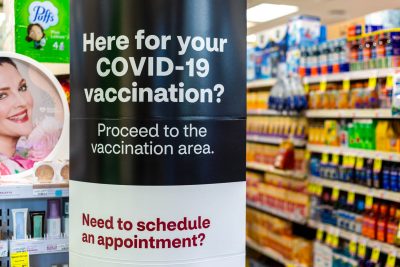
The first case of the Omicron variant of COVID-19 was detected in Massachusetts on Saturday.
The individual is a fully vaccinated female in her 20s and a resident of Middlesex County who traveled out-of-state, according to a Saturday press release from the Massachusetts Department of Public Health. She experienced only mild disease and did not require hospitalization.
Many characteristics of Omicron are still unclear, as scientists continue to analyze it and compare it to the Delta variant.
Paul Beninger, associate professor of public health and community medicine at Tufts University, said there are 50 or so mutations of Omicron, raising three types of concerns.
“One concern has to do with the speed at which it can replicate, get into cells, replicate and then break out of cells,” Beninger said, “So that’s what the Delta did. It was faster than all the other variants, and so it really just basically took over.” Paul Beninger, associate professor of public health and community medicine at Tufts University, said.
The second concern is regarding the severity of the disease that can come from the variant, he said. But the severity of Omicron is unknown so far, including whether Omicron will cause different symptoms compared to earlier variants.
“In theory, it may be at risk of causing more serious disease, but there’s no real evidence yet of whether that’s happening,” he said.
Assistant professor of public health and community medicine at Tufts University Laura Corlin, echoed Beninger, saying not much is known about the transmissibility or severity of the Omicron variant.
“There’s not a lot of evidence yet,” she said. “The researchers and public health officials and folks in South Africa and other places have been really great at the surveillance and they’ve been getting as much data as they possibly can as quickly as possible.”
Beninger said the third concern is the effectiveness of current vaccines toward Omicron.
“We have, really, no data at all with regards to how it’s affected by the vaccines that are out there,” he said. “So we’re very much in the discovery phase, the very beginning in discovering what the potential is of this particular variant.”
Even if there are many unknowns about the Omicron variant, it is recommended people get vaccinated as soon as possible, Beninger said. People should still get boosters to protect themselves as well, he said.
“Any booster we give is going to enhance the natural immune system of the person and is going to help the person to be even more protected than before,” he said.
The effectiveness of vaccines toward the new variant remains to be tested, Corlin said, but it is likely still helpful to be vaccinated.
“If people are eligible for boosters and have not yet had their booster shot, they should get the booster as soon as possible,” Corlin wrote in an email. “It is fine to mix-and-match vaccine types.”
Current vaccines still serve well to protect people, said Jarone Lee, medical director of the Blake 12 Intensive Care Unit and an emergency physician at Mass General Hospital.
“There’s a lot that we don’t know about this variant, but it is still the same virus,” he said. “Our vaccines work very well against all the variants of COVID previously, there’s no reason to believe that it will not protect you.”
Previous COVID-19 precautions still apply to the new variant.
The Boston Public Health Commission urges residents to continue to wear masks indoors, practice social distancing, monitor for symptoms and get tested for COVID-19 if experiencing symptoms to stop the spread of the variant, wrote Bisola Ojikutu, executive director of BPHC, adding that the Commission is “doubling-down” on its recommendation that people get the vaccine and booster shot.
“Our top priority is to keep the people of Boston safe and healthy and to ensure our schools and businesses can stay open,” she wrote. “That requires getting as many people vaccinated as possible.”
Pfizer, Moderna and other vaccine manufacturers are most likely getting ready to make new vaccines, but the public should quickly get their booster shots under the presumption that it’ll help with the Omicron variant, said Philip Landrigan, Doctor and Global Public Health program director at Boston College.
Landrigan added the public should protect themselves the same way as last year, by “masking, handwashing, social distancing and avoid[ing] large gatherings.”
Nationally, cases of the Omicron variant have been reported in 18 states. According to the CDC, while the focus has been on the Omicron variant, the Delta variant remains the most circulated strain in the United States.






























































































































